We have for a long time hesitated to adopt and carry out the only principle which can solve that difficulty and give peace, strength and security to the republic, and that is the principle of absolute equality. We are a country of all extremes, ends and opposites; the most conspicuous example of composite nationality in the world. Our people defy all the ethnological and logical classifications. In races we range all the way from black to white, with intermediate shades which, as in the apocalyptic vision, no man can name or number.
-Frederick Douglass, Our Composite Nationality, 1869
One could easily be excused for emerging from last night’s presidential debate convinced that American democracy is under direct assault by the president of the United States. I take absolutely no pleasure in this observation. This is an extraordinarily dangerous moment for our nation, and with so much on the line in this upcoming election, we must unequivocally condemn positions and policies antithetical to who we are as a people.
As pundits continue to dissect what happened last night, and as we gird ourselves for two more debates still to come between President Trump and Vice President Biden, we must not lose sight of three key points:
1. White supremacy is a vile, racist dogma, and white supremacist groups as entities are a threat to the domestic and national security of the United States.
I had the honor last year of leading a subcommittee effort within the Homeland Security Advisory Council to produce recommendations to end targeted violence against American faith communities. This study tackled the increasingly pervasive violent attacks on the Black Christian community, violent antisemitism and Islamophobia, and attacks on the Sikh and Hindu communities. Over and over, our studies and field research confirmed that the principal causal factors for this violence against all of America’s faith-based communities—and more broadly on America’s communities of color—are white supremacist groups and their violent, armed cadres. The Department of Homeland Security and the FBI confirmed the reality of this violence and concurred in the nature and enormity of this threat to the U.S.
In last night’s debate, Mr. Trump not only refused to condemn and disavow white supremacists, he called on one group, the so-called Proud Boys, to “stand back and stand by.” This is an organization widely condemned as a hate group, with white nationalist rhetoric permeating their every move. Whatever the president intended with this provocative phrase is irrelevant because this group has embraced it as validation of their cause and a call to arms itself.
2. Both candidates must loudly and unambiguously disavow politically motivated violence, and that includes preventing supporters from descending on the polls to provide vigilante “security” of our electoral process. Any refusal to endorse this basic protection of American lives and the sanctity of our democracy should be understood as a willingness to condone violence and de facto mob rule.
This second area of deep concern centers around Mr. Trump’s unfounded attacks on the 2020 presidential electoral process as unfair and rigged against him, and on mail-in voting as inherently fraudulent and invalid. These twin, baseless accusations seem specifically tailored to confuse and frighten the American voter and create uncertainty about the election’s outcome. This is not the time to wish away the president’s remarks as usual, empty rhetoric—no, this amounts to a direct attack upon the American democratic process of voting.
Furthermore, in the White House press room, Mr. Trump recently refused to acknowledge acceptance of a peaceful transition of power if he loses and refused to call for a restraint on violence if that occurs. During the debate, he also called on his supporters to go into the polls to ensure the election’s security. Given the rallying cry during the debate of “Stand Back and Stand By,” inevitably, on November 3rd, I truly fear American voters will find both unarmed Trump supporters and armed, white supremacists groups at the polls seeking to “guard” our democratic process. The handwriting is clearly on the wall. Were we to hear such threats in any developing country, we would label it for what it is: dangerous and authoritarian. For it to come from our president a month from the election speaks to the enormity of this American crisis.
3. To achieve our full potential as a nation that stands for social justice, the rule of law, and the defense of democracy, we must invest in education on the causes and remedies of systemic racism in America. This is essential not just for the health of our own democracy, but for our ability to remain a transformational leader on these and related issues around the world.
Given the president’s recent public unwillingness to discourage violence if he loses the election, this final point is particularly disturbing. When, during the debate, he was confronted with the response that the FBI and the Department of Homeland Security both see white supremacists as a domestic and national security threat, Mr. Trump proclaimed them both to be wrong, just as he says he knows better than his doctors and experts on COVID-19 and better than the scientists on climate change. It should come, then, as no surprise that in the same debate, he proclaimed racial sensitivity instruction within the U.S. government as “racist” propaganda against white Americans. And his recent executive order is intended to stamp it out, conveying, intentionally or otherwise, that being American is rooted in being, first and foremost, white.
These three points should be easily accepted by both Republicans and Democrats. Yet, what emerged during the debate was a stark and disturbing divergence between the best traditions of American democracy and the jarring reality of Mr. Trump’s concept of governing this country. These differences are not lost on the electorate, which is currently experiencing the effects of widespread and dangerous political polarization. Nor are they lost on the international community, where allies are confused and concerned, authoritarians are comforted, and America’s enemies are afield, more brazen than ever, and on the march.
The stakes of this upcoming election may indeed be existential for the future of our American democracy. I previously called for Americans to mark their calendars that June 1st, when President Trump stood before St. John’s Episcopal Church in Washington, D.C., just moments after ordering the assault of peaceful protestors, could be the beginning of the end of the American experiment. Yet, even then, I could not have imagined the tremendous nature of the threat we now face as a people. If then, June 1st was a starting point for our moment of true national peril, September 29th confirmed unequivocally that we are now far down that road. November 3rd may indeed be the most important date for these United States in living memory. The stakes are enormous and, in that moment, America will either step back from cliff or go over entirely.
America stands upon the edge of a knife. Please vote. Our shared future as a compassionate, inclusive society of values and laws depends on it.
The Brookings Institution is committed to quality, independence, and impact.
We are supported by a diverse array of funders. In line with our values and policies, each Brookings publication represents the sole views of its author(s).
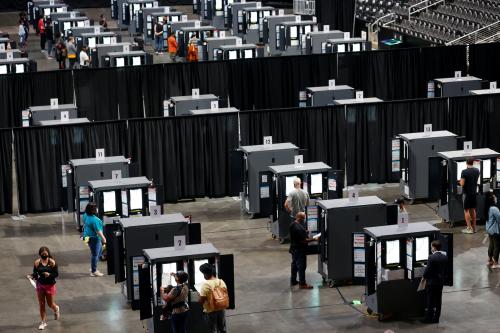
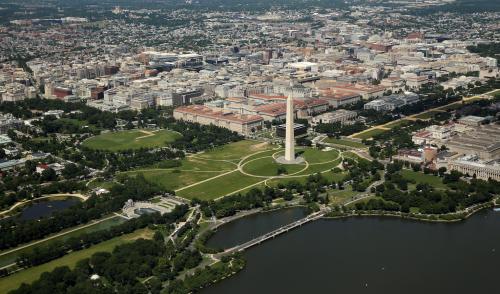
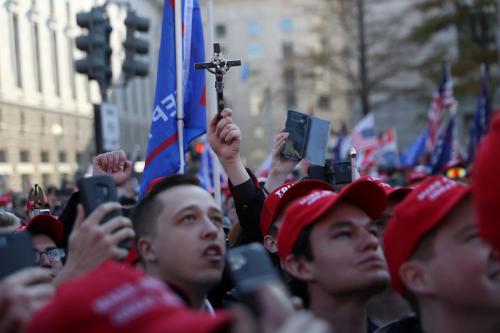
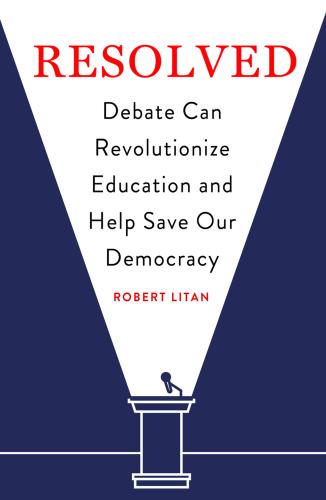
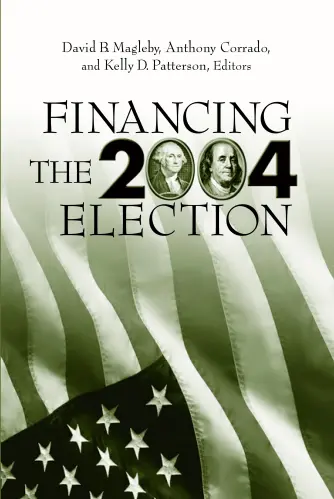
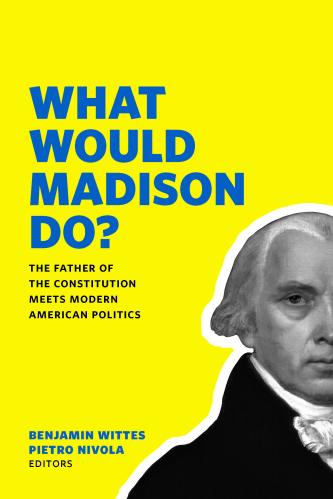

Commentary
America’s democracy on the edge
September 30, 2020